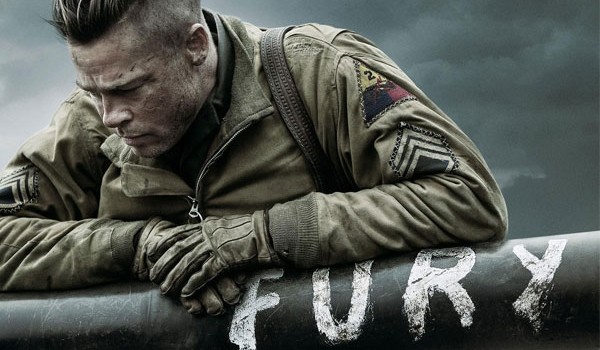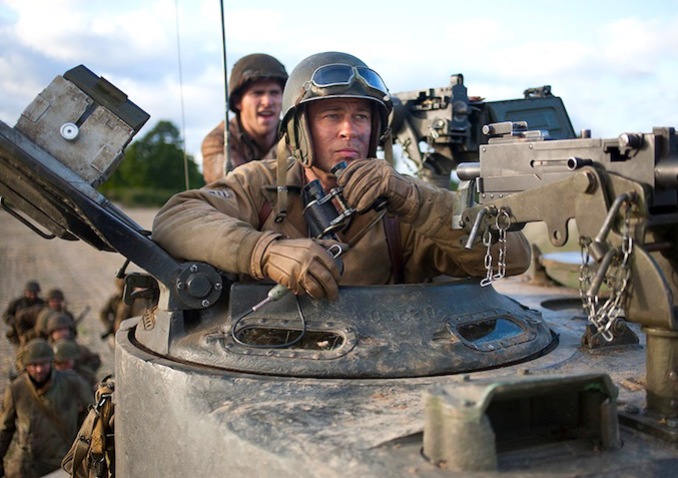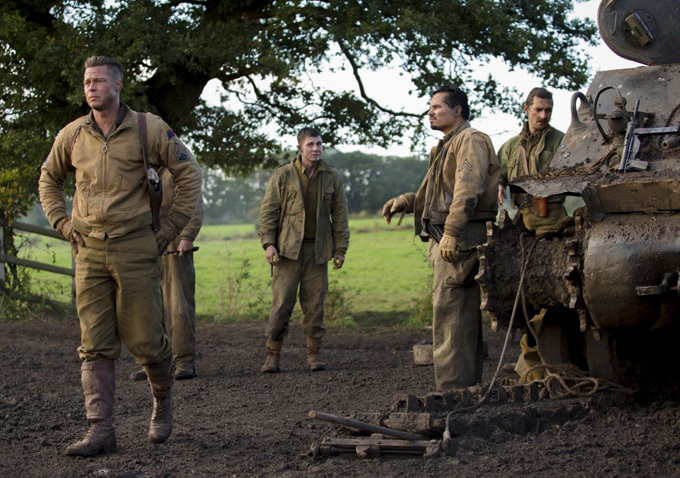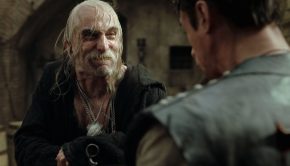Fury – Film Review
Reviewed by Damien Straker on October 22nd, 2014
Sony presents a film by David Ayer
Produced by Bill Block, John Lesher, Alex Ott, Ethan Smith and David Ayer
Written by David Ayer
Starring: Brad Pitt, Shia LaBeouf, Logan Lerman, Michael Peña and Jon Bernthal
Music by Steven Price
Cinematography: Roman Vasyanov
Edited by Dody Dorn
Running Time: 134 minutes
Rating: MA15+
Release Date: October 23rd, 2014
Set in the final year of the Second World War, Fury is the story of how a young man enters combat and becomes a killing machine. How the film and its director David Ayer feel about the premise is ideologically confused and contradictory. On one hand the film is a brutal representation of the final tank battles of the war and how merciless the Allies were to Germans and their prisoners as a way of saving their own hides. Yet the film’s fascist politics are exemplified by showing how young men become accepted into the brainless, macho brotherhood of their peers once they are capable of murdering enemies without hesitation. Some will dismiss the film as a silly boy’s club adventure, but this does little to dispel the unsavouriness. Fury’s timing is as misjudged as it is deliberate. In an era of contemporary global warfare, it’s a film disturbingly unconcerned by psychology or battle scars but celebrating how many kills a single tank crew can score for their country.
Fury doesn’t have a plot but is a road trip, compromised of a series of battles and the occasional pit stop for male bonding. Brad Pitt stars as Don “Wardaddy” Collier” the leader of a five man Sherman tank vehicle named “Fury”. Wardaddy believes in the kill or be killed rules of war. In a troubling early scene, he physically forces Norman (Logan Lerman) to shoot a captured German soldier in the back with a revolver. Norman is the young rookie who is our only emotional entry point into the crew. He has only been in the war for eight weeks as a typist and has not see combat before being inserted into the crew. He cries and says he would rather die himself than to shoot a prisoner. The early scenes allow Logan Lerman’s performance to standout by emoting Norman’s fear and passivity. However, the character’s inexperience is highly contrived, predictably segueing him from a rookie and into a raging machine gunner, mowing down Germans as he screams at them.
The other characters in Ayer’s own original script are lazy stereotypes. Shia LaBeouf is Boyd “Bible” Swan who, would you know it, quotes passages from the Bible. Michael Pena from Ayer’s last film End of Watch, which was about the friendship between two police officers, features as Trini “Gordo” Garcia but his role makes little use of his charisma. The most unlikable part is reserved for Jon Bernthal as Grady, a knuckle-dragging brute, who might have been too unpleasant for the Dirty Dozen. There is almost no backstory, aside from the original tank crew being together since Africa and their dialogue is primarily inane, blokey conversations, compromised of homophobic slurs and primitive views of women. Some of this material is inaudible due to the slurred, mumbling line deliveries.
One unexpected detour in the film is a long sequence where Wardaddy takes Norman aside and into a home with two German women. As Wardaddy takes off his equipment, we fear the worst. But the scene shows an unexpected side to his character. He encourages Norman and the two women to share a meal together. The other members of the tank crew enter, behaving like barbarians. They complain they weren’t invited and upset the youngest women by making her cry, until Wardaddy pulls them into line. It’s a strange scene for a number of reasons: it’s one of the few moments of mercy and while we appreciate seeing a new side to Wardaddy it makes little sense how someone so dogmatic about serving the company would risk dividing his team by helping Norman. Maybe war makes people act in funny ways or Wardaddy has spent too long in the tank.
While his script is disappointing, Ayer hasn’t wasted the eighty million dollar budget. The production values, including the filthy, grimy look and diluted grey tones, are of a high standard. The scenes are very well populated with plenty of extras including wounded soldiers, prisoners and other tanks, which are important details because it means Fury’s crew isn’t the only tank group fighting in the war. But the realism is undermined in the last battle where Fury alone must withstand a huge swarm of Nazi troops, too stupid to immediately use anti-tank weapons. The corn in this sequence, compromised of bromancing and personal sacrifice, is a lame retread of war movie conventions and lacks further power since it’s difficult to care for these generic characters. The battle itself, with an implausible body count, will appeal to Michael Bay enthusiasts and teenagers who think video games like Call of Duty resemble real world politics.
The film’s ending further typifies the film’s indecisive political viewpoint. A moment of compassion between two soldiers is immediately undone by a final high angle shot, which shows a single tank and the masses of bodies it has laid waste upon. War films aren’t an untouchable genre today but when the budget and the talent are this big a filmmaker should sustain a clear ideological viewpoint. At a time when real war affects so many people’s lives, wouldn’t a genuine act of courage today be if a Hollywood director could be forthright about how they feel about warfare and give the audience something to dwell over once the movie has emptied its barrels?
Summary: It's a film disturbingly unconcerned by psychology or battle scars but celebrating how many kills a single tank crew can score for their country.









